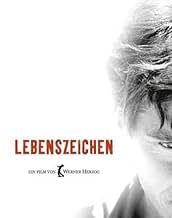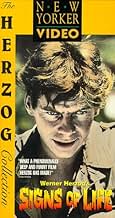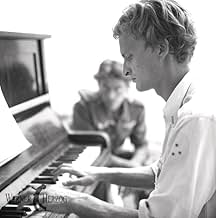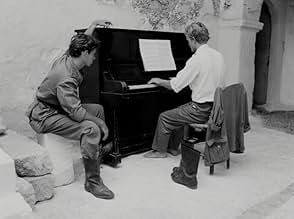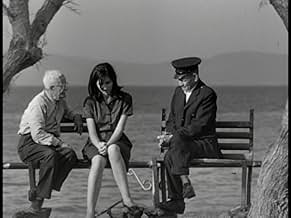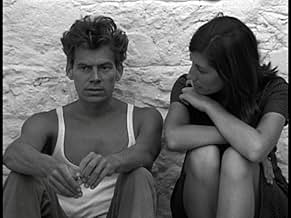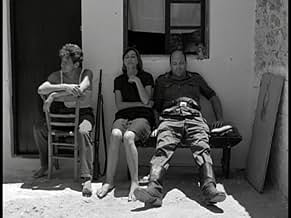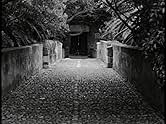IMDb रेटिंग
7.0/10
2.5 हज़ार
आपकी रेटिंग
अपनी भाषा में प्लॉट जोड़ेंThree wounded soldiers are removed from battle and given the task of looking after a fortress in a small coastal town. However, the pressures of isolation begin to take their toll on the men... सभी पढ़ेंThree wounded soldiers are removed from battle and given the task of looking after a fortress in a small coastal town. However, the pressures of isolation begin to take their toll on the men.Three wounded soldiers are removed from battle and given the task of looking after a fortress in a small coastal town. However, the pressures of isolation begin to take their toll on the men.
- पुरस्कार
- 2 जीत और कुल 2 नामांकन
Werner Herzog
- Soldat
- (बिना क्रेडिट के)
कहानी
क्या आपको पता है
- ट्रिवियाWerner Herzog's first feature film. Often regarded as a pioneer of New German Cinema, his films often feature ambitious protagonists with impossible dreams, people with unusual talents in obscure fields, or individuals in conflict with nature. In 1961, when Herzog was 19, he started work on his first film Herakles. He has since produced, written, and directed over 60 films and documentaries. He has also published over 12 books of prose and directed many operas. French filmmaker François Truffaut once called Herzog "the most important film director alive." American film critic Roger Ebert said that Herzog "has never created a single film that is compromised, shameful, made for pragmatic reasons, or uninteresting. Even his failures are spectacular." He was named one of the world's 100 most influential people by Time in 2009.
- भाव
Young Child: Now that I can talk, what shall I say?
- कनेक्शनFeatured in Was ich bin, sind meine Filme (1978)
फीचर्ड रिव्यू
Werner Herzog's first film is a view into the mindset of the soldier who goes over the brink, but unlike many films that might explore the concept, or even Herzog's own later, arguably greater, Woyzeck, Signs of Life is about a man engulfed by the location. The setting is interesting right away; a stone fortress that men who have been wounded or just put on leave are guarding on a remote Greek island during WW2 (of course, we're never told this, which is appropriate, one can take a guess as to the significance of Herzog's POV as part of the New German cinema), and aside from the cockroaches and painting doors, there's not much to do. The mundane becomes engulfing, even as there's little things to do on the island. It's always bubbling under the surface, and as the days pass and things start to grow more aimless, Stroszek (Peter Brogle, with the kind of eyes and demeanor Kubrick would've loved to film) distances himself, sets of fireworks in his hands, and snaps one day out on patrol.
If anyone knows Herzog, the tale of a man going "berserk", as one officer says in this film of the main character, this shouldn't be seen out of the ordinary. Herzog has always tried to explore not so much of the precise 'whys' of the snap, or the break under pressure, or society's role or those around in personal quarters. Of course it's suggested a lot of the time, but in the case of Signs of Life we see much of the insanity in very long shots, with Stroszek going mad in the last twenty minutes on top of the fortress, wavering around, surrounded still by the immense landscape - an "inner" landscape, mayhap, as Herzog describes so often of his perspective on landscapes - of the fortress set against the background of the sea and mountains. But if one were seeing this as the first feature of some 26 year old Bavarian who only made a few shorts (one of which was similar somewhat to Signs of Life), this would seem like the most unclassifiable "genre" film ever made.
It's a movie about soldiers who don't fight, and with images like cut aways to peasants running and rummaging in the streets, a bird, a bunch of statues, stone tablets. And then when Stroszek does snap, we don't hear any audio, just the intense plucking of the guitar by the Greek composer, as Herzog pans over a whole field of windmills. And where else would one ever see something like when the bald soldier is setting up the trap for the roaches? Or the segway with the guy who thinks that he's a King? The first half of the movie is unsettling because it doesn't seem like it's going anywhere, and yet I kept on wanting to stay with Herzog (not even because I knew where it was going); there's something underneath all of the ho-hum "non" drama that goes on, little bits of behavior in the lackadaisical, that when finally things pick up dramatically it starts slowly, then builds, goes to a peak, and then...
Well, you'll just have to see for yourself. All I know is that you're likely not to see another film like Signs of Life- much less a debut from a major European film artist- where the climax entails fireworks going off while practical martial law is placed over the island. Herzog doesn't follow any rules, and it can get frustrating here and there. But it's also exhilarating, and I would probably count it in my top 10 favorites of the director.
If anyone knows Herzog, the tale of a man going "berserk", as one officer says in this film of the main character, this shouldn't be seen out of the ordinary. Herzog has always tried to explore not so much of the precise 'whys' of the snap, or the break under pressure, or society's role or those around in personal quarters. Of course it's suggested a lot of the time, but in the case of Signs of Life we see much of the insanity in very long shots, with Stroszek going mad in the last twenty minutes on top of the fortress, wavering around, surrounded still by the immense landscape - an "inner" landscape, mayhap, as Herzog describes so often of his perspective on landscapes - of the fortress set against the background of the sea and mountains. But if one were seeing this as the first feature of some 26 year old Bavarian who only made a few shorts (one of which was similar somewhat to Signs of Life), this would seem like the most unclassifiable "genre" film ever made.
It's a movie about soldiers who don't fight, and with images like cut aways to peasants running and rummaging in the streets, a bird, a bunch of statues, stone tablets. And then when Stroszek does snap, we don't hear any audio, just the intense plucking of the guitar by the Greek composer, as Herzog pans over a whole field of windmills. And where else would one ever see something like when the bald soldier is setting up the trap for the roaches? Or the segway with the guy who thinks that he's a King? The first half of the movie is unsettling because it doesn't seem like it's going anywhere, and yet I kept on wanting to stay with Herzog (not even because I knew where it was going); there's something underneath all of the ho-hum "non" drama that goes on, little bits of behavior in the lackadaisical, that when finally things pick up dramatically it starts slowly, then builds, goes to a peak, and then...
Well, you'll just have to see for yourself. All I know is that you're likely not to see another film like Signs of Life- much less a debut from a major European film artist- where the climax entails fireworks going off while practical martial law is placed over the island. Herzog doesn't follow any rules, and it can get frustrating here and there. But it's also exhilarating, and I would probably count it in my top 10 favorites of the director.
- Quinoa1984
- 13 दिस॰ 2007
- परमालिंक
टॉप पसंद
रेटिंग देने के लिए साइन-इन करें और वैयक्तिकृत सुझावों के लिए वॉचलिस्ट करें
- How long is Signs of Life?Alexa द्वारा संचालित
विवरण
- रिलीज़ की तारीख़
- कंट्री ऑफ़ ओरिजिन
- भाषाएं
- इस रूप में भी जाना जाता है
- Signs of Life
- फ़िल्माने की जगहें
- Kos, यूनान(main location)
- उत्पादन कंपनी
- IMDbPro पर और कंपनी क्रेडिट देखें
बॉक्स ऑफ़िस
- बजट
- DEM 25,000(अनुमानित)
- चलने की अवधि1 घंटा 30 मिनट
- रंग
- ध्वनि मिश्रण
- पक्ष अनुपात
- 1.37 : 1
इस पेज में योगदान दें
किसी बदलाव का सुझाव दें या अनुपलब्ध कॉन्टेंट जोड़ें


